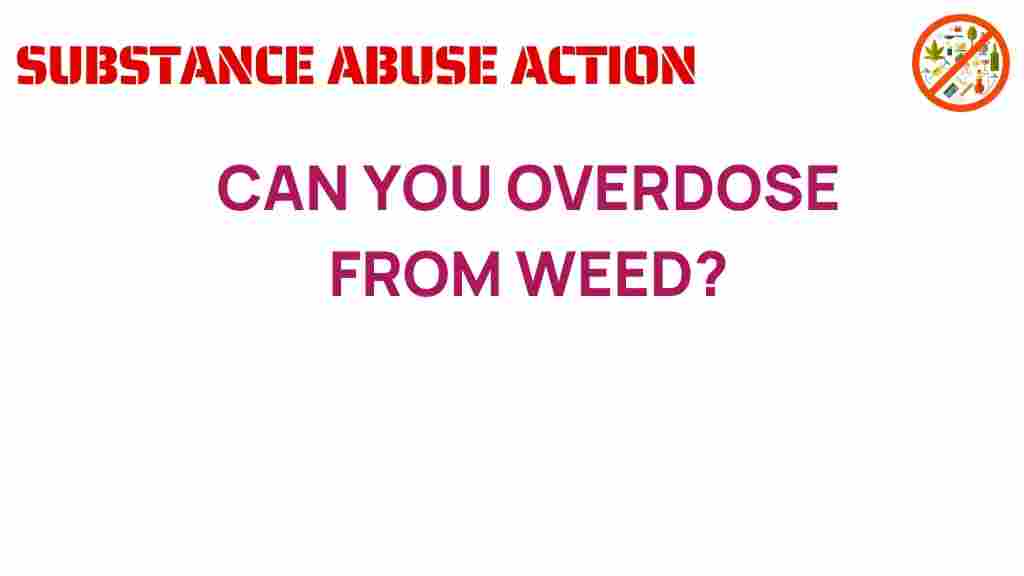The Surprising Truth: Can You Overdose from Weed?
As cannabis becomes increasingly popular for both recreational and medicinal use, the conversation around its safety and risks is more important than ever. Many people wonder, “Can you overdose from weed?” This article will explore the concept of a weed overdose, the health effects of cannabis, and the implications of THC toxicity. We will also discuss cannabis safety, marijuana risks, addiction awareness, and harm reduction strategies to ensure responsible use.
Understanding Weed Overdose
First, it’s essential to clarify what we mean by a “weed overdose.” Unlike substances like opioids or alcohol, the term overdose in the context of cannabis does not typically refer to a fatal outcome. Instead, a weed overdose can encompass a range of unpleasant and distressing symptoms resulting from consuming too much THC (tetrahydrocannabinol), the primary psychoactive component in cannabis.
While it is nearly impossible to consume a lethal dose of cannabis, excessive intake can lead to temporary physiological and psychological effects that can be uncomfortable. Understanding these effects and recognizing when someone is experiencing a weed overdose is crucial for ensuring cannabis safety.
The Health Effects of Cannabis
The health effects of cannabis can vary significantly depending on several factors, including the strain, method of consumption, and individual tolerance levels. Here are some common effects:
- Positive Effects: Euphoria, relaxation, increased appetite, altered perception of time.
- Negative Effects: Anxiety, paranoia, dizziness, memory impairment, and in severe cases, hallucinations.
When discussing the risks associated with marijuana, it’s essential to consider the potential for THC toxicity. High doses of THC can lead to symptoms such as:
- Rapid heart rate
- Confusion or disorientation
- Nausea and vomiting
- Severe anxiety or panic attacks
- Difficulty concentrating
Step-by-Step Process: How to Use Cannabis Safely
To mitigate the risks associated with cannabis use and to avoid a weed overdose, follow these guidelines:
- Know Your Strain: Different strains of cannabis have varying levels of THC and CBD (cannabidiol). Research the strain you plan to use and choose one that fits your experience level and desired effects.
- Start Low and Go Slow: Especially for beginners, it is crucial to start with a low dose. For edibles, this often means starting with 5-10 mg of THC.
- Choose Your Method Wisely: Different methods of consumption can lead to different experiences. Smoking or vaping provides immediate effects, while edibles can take longer to kick in, leading to potential overconsumption.
- Stay Hydrated: Drink water to help alleviate dry mouth and other discomforts associated with cannabis use.
- Be in a Safe Environment: Use cannabis in a familiar and comfortable setting, preferably with trusted friends who can provide support if needed.
Troubleshooting Tips for Weed Overdose Symptoms
If you or someone you know is experiencing symptoms of a weed overdose, consider the following tips:
- Stay Calm: Remind the person that the effects will pass and that they are not in any immediate danger.
- Find a Comfortable Position: Sitting or lying down in a quiet environment can help reduce anxiety and discomfort.
- Use CBD: Cannabidiol (CBD) can counteract some of the psychoactive effects of THC and may help alleviate anxiety and paranoia.
- Focus on Breathing: Deep breathing exercises can help calm the mind and reduce feelings of panic.
- Seek Help if Necessary: If symptoms persist or worsen, it may be necessary to contact a healthcare professional.
The Importance of Drug Education
Drug education plays a vital role in promoting cannabis safety and awareness. Understanding the risks associated with marijuana use, including the potential for a weed overdose, can help users make informed decisions. Educational programs should focus on:
- The science of cannabis: Understanding THC, CBD, and the endocannabinoid system.
- The legal landscape: Awareness of local laws regarding cannabis use.
- Health implications: Discussing both the benefits and risks associated with cannabis consumption.
- Harm reduction: Strategies for minimizing the risks associated with cannabis use.
For more detailed information on drug education and harm reduction, visit Drug Policy Alliance.
Addiction Awareness and Responsible Use
While cannabis is often considered less addictive than substances like alcohol or opioids, it is important to recognize that some individuals may develop a dependency on marijuana. Understanding the signs of addiction and promoting responsible use can help mitigate this risk.
Signs of cannabis addiction may include:
- Inability to cut down on use despite wanting to
- Using cannabis in risky situations (e.g., while driving)
- Neglecting responsibilities due to cannabis use
- Experiencing withdrawal symptoms when not using
To promote addiction awareness, consider engaging in community discussions about cannabis use and sharing resources that emphasize the importance of moderation and self-awareness.
Conclusion: Embracing Safe Cannabis Practices
In conclusion, while the question “Can you overdose from weed?” often leads to misconceptions, it is clear that excessive cannabis consumption can result in uncomfortable and distressing symptoms. By focusing on cannabis safety, understanding the health effects of THC toxicity, and promoting drug education and addiction awareness, individuals can make informed choices regarding their cannabis use.
Remember that harm reduction strategies, such as starting with low doses, being aware of your limits, and using cannabis in safe environments, can significantly enhance your experience while minimizing risks. As cannabis continues to be integrated into society, it is crucial to prioritize education and safety for all users.
For further reading on cannabis safety and harm reduction strategies, check out our resource on responsible cannabis use.
This article is in the category Health and created by SubstanceAbuseAction Team
